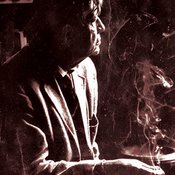day by day: a blog
November 21, 2008
poet and gun
In spite of the fact that the main thing I do is read y'know, like, poems, people in academia sometimes describe my work on Auden as "biographical" (which is a not very subtle scholastic codeword for "empirical", "positivistic" or "idea-free"). Whenever such interlocutors -- who usually have some heavy but unacknowledged "biographical" investments of their own -- make this sort of remark, I always try to smile politely and ignore the snub. After all, nothing worth anything is or should be immune from challenge. Whatever needs saying will meet resistance.
But this notion about my critical project does disappoint me because it constitutes a misunderstanding, even a mischaracterization, of my aims. To me, as to almost everyone else, the life of a poet is not the baseline to which that poet's oeuvre is tied. A love-affair, a meeting or a death does not explain a poem or circumscribe its meaning. Still, if you treat the events of a life -- journeys, remarks in letters, the places where things happened -- as having both a literal and a figurative status, as if, in additional to being historical data, they wove their own text as a kind of elliptical commentary on the poems which arose out in their vicinity, then sometimes biographical information contains clues, hints, suggestions which can lay bare energies and meanings which would otherwise lie occluded in a poem's deep subsoil.
You have to watch for these hints, like a dowser searching for water. Not everything is meaningful. Or, better, no-one (least of all me) can understand how to make use of everything that lies to hand. In any given pair of eyes, some anecdotes shimmer with a suggestive luster which others do not have.
Perhaps, for that glow to exist, it is essential that the incident seem to hint at something which runs counter to a received truth.
Today, for example, I find my mind running on Auden's imaginative interest in violence. It may be that the thought came into my mind because of a letter I received from Michael Auden, Auden's second cousin once removed (that is to say, Michael is the son of Auden's first cousin, Lt.-Col. Humphrey Auden). "I only met Wystan once, after the War", Mr. Auden comments, speaking about an encounter which took place at the family home, Danesgate, in Repton, Derbyshire. It may well have been during the trip which Auden made to Europe in the spring of 1948. He continues: "I was shooting young Rooks for the pot in the rookery trees at Danesgate, and Wystan asked if he could have a shot. The rifle had a hair-trigger, and he nearly put a bullet into his foot!"
What to do? Laugh at the punchline joke about a namby-pamby poet almost shooting himself in the foot? Or instead wonder whether any other eminent poet of the mid-century (a Pulitzer prize-winner in the very year when this incident probably occurred!) would have been curious to handle a gun? I prefer the latter option. It goes against everything we fondly imagine about the mildness and bookishness of poets. It goes against everything that Auden is supposed to stand for. It is the kind of clue -- tiny and ephemeral and disgard-able and provocative -- which could send one back to Auden's poems, re-sensitized, musing.
At the time when this incident happened, Auden was just beginning work on his "Horae Canonicae" cycle about the meaning of Chist's crucifixion. It was to be, if you look at it from a certain angle, a kind of murder story....
Posted by njenkins at November 21, 2008 04:03 PM
With the exception of interspersed quotations, all writing is © 2007-09 by Nicholas Jenkins